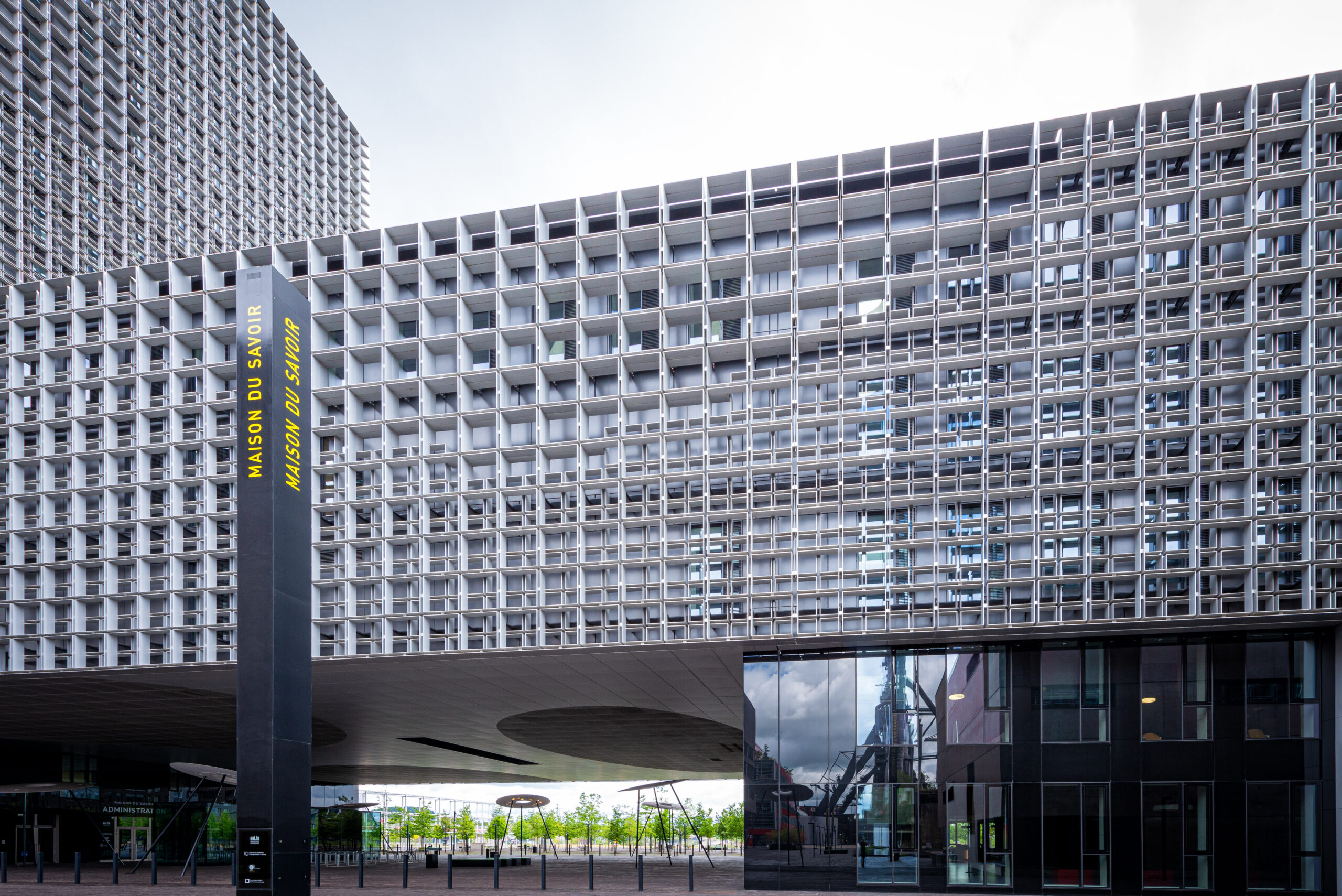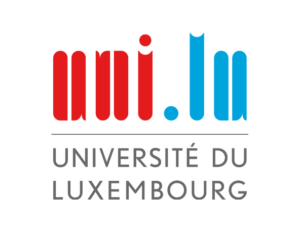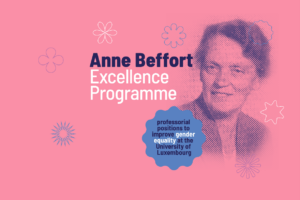- English
- DEUTSCH
- SPANISH
- FRENCH




Founded in 2003, the University of Luxembourg was established by merging four institutions, becoming the country’s only public university, designed with a strong focus on being research-intensive, multilingual, and international.
The University strives to be “A University for Luxembourg and the world”, shaping societal, cultural, technological, and economic development through proactive engagement with public and private partners.
It aims to deliver excellent research, high-quality education, and measurable societal impact, with a core emphasis on interdisciplinary and international collaboration.
The University enrols over 8,000 students, including more than 1,000 doctoral candidates. Its academic community consists of 1,600 members of staff, including 300 professors, with a total of 2,500 employees working at the University. With about 60% of its student body coming from abroad and representing around 150 nationalities, the University is a truly multicultural institution. It is recognised among the top 20 young universities worldwide by Times Higher Education and ranks within the top 250 globally. In 2025, the University proudly joined The Guild, an alliance of 23 research-intensive universities in Europe.

Bachelor Students
Master Students
Doctoral Candidates
The University of Luxembourg plays a central role in advancing Luxembourg’s national ambition to further develop a sustainable, knowledge-driven, and digitally advanced society. Anchored in the National Research and Innovation Strategy, the University pursues three core missions: research, higher education and the contribution to the social, cultural and economic development of Luxembourg. To achieve its long-term strategic goals, the University has identified key areas within each of its three missions:
The University advances knowledge and innovation in strategic areas that drive economic and societal progress. These include digital transformation (e.g., AI and supercomputing, the Luxembourg Hub in Cybersecurity, Lux Quantum Communication Infrastructure), medicine and health (e.g., neurodegenerative diseases, cancer research, behavioural and cognitive psychology, Bachelor’s in Medicine and Health Professions), as well as sustainable and societal development (educational sciences, renewable energy, European and international law, (sustainable) finance).
In line with the national strategy for 21st Century Education, the University delivers high-quality, research-based teaching rooted in multilingualism, international mobility, and strong links to public and private sectors. It promotes innovative learning, integrates teaching and research, and fosters a dynamic, diverse student community.
The University actively contributes to social, cultural, and economic development. It supports entrepreneurship, knowledge transfer, and policy innovation, helping transform scientific discoveries into practical applications (“from science to impact”). Through ongoing dialogue with stakeholders and society at large, it maximises the relevance and reach of its research.

The Anne Beffort Excellence Programme is a flagship initiative of the University of Luxembourg, dedicated to fostering excellence, diversity, and gender equality in academia. Named after Anne Beffort—the first Luxembourgish woman to earn a doctorate—the programme seeks to increase the proportion of female professors and create an inclusive academic culture that supports future generations of women in research.
Launched in 2024 and endorsed by the Luxembourg Ministry for Gender Equality and Diversity, the programme is part of the University’s broader efforts to attract international talents and reflects a commitment to advancing academic leadership among women.
Anne Beffort (1880–1966) was a pioneering educator, literary scholar, and fierce advocate for women’s education. As the first Luxembourgish woman to earn a doctorate, she played a vital role in advancing gender equality in academic and cultural life.
Anne Beffort Professors receive:
Learn more here.
The programme is part of the University’s Gender Equality Policy implementation plan, which outlines a long-term strategy to embed equality across all areas of university life. Key policy areas include:
These commitments are monitored through regular gender audits and annual reporting to the Rector and Board of Governors. The Anne Beffort Excellence Programme translates this institutional vision into tangible academic career opportunities, helping to shape a more inclusive and excellent research environment.
For more, visit: Anne Beffort Positions – University of Luxembourg
Open positions within the Anne Beffort Excellence Programme are in the departments of Computer Science, Engineering and Mathematics.
We invite applications from outstanding scholars committed to advancing research, teaching, and engagement in the following areas:
The Department of Engineering (DoE) at the University of Luxembourg is interdisciplinary and active in the classical domains of civil, electrical, mechanical, and computational engineering. The focus of research is on the development of technological solutions, the sustainable and economical use of all kinds of resources and the offer of competences for the technological requirements of industrial and public actors in Luxembourg and the Greater Region. Special emphasis is given to numerical simulation to reduce the required experimental effort, but the validation of the models on laboratory setups will remain an essential asset.
The Department of Computer Science (DCS) at the University of Luxembourg investigates and contributes to shaping the interface between information and communication technology and society. DCS promotes interdisciplinary research and closely cooperates with other high-profile research centers in Luxembourg and beyond, as well as with industry and society. The Faculty entertains various successful and growing teaching programs and supports lifelong learning activities.
The Department of Mathematics (DMATH) at the University of Luxembourg is recognized internationally for leading research in both fundamental and applied areas of Mathematics.
DMATH offers a Bachelor’s program and three Master’s programs, alongside a robust range of outreach activities, and is dedicated to training the next generation of researchers – PhD candidates and postdoctoral scholars. With a permanent staff comprising 12 full professors, 2 associate professors, and 1 assistant professor, DMATH covers a wide spectrum of research areas: (1) Algebra and Number Theory, (2) Geometry and Topology, (3) Probability and Stochastic Analysis, (4) Discrete and Geometric Analysis, (5) Statistics and Data Science, and (6) Partial Differential Equations and Modelling.
in the THE (Times Higher Education) Young University Ranking 2024
among the top 250 Universities worldwide according to the THE World University Ranking 2024
worldwide in the QS World University Rankings 2025
in Europe in the QS World University Rankings 2025
Over the past two decades, Luxembourg has transformed into a dynamic knowledge-based society with a thriving research ecosystem. As a world-class research university, the University of Luxembourg is at the heart of this transformation, offering academic staff the opportunity to shape education and innovation in a uniquely international setting.
Today, the University employs more than 2,500 staff, making it one of the 20 largest employers in Luxembourg.
Luxembourg’s research landscape is unified under the Research Luxembourg initiative—a strategic alliance of the University of Luxembourg, public research centres (LIH, LIST, LISER), and the Luxembourg National Research Fund (FNR).
This national ecosystem offers:
Luxembourg offers a unique blend of cosmopolitan energy and natural beauty, with high standards in public services, infrastructure, and healthcare. The country is:
Newcomers will find a welcoming environment with comprehensive services for housing, childcare, education, and integration. The University provides extensive relocation support, family-friendly policies, and access to childcare services.
For practical guidance, visit: Just Arrived Luxembourg
Lisbeth is the Managing Partner, Netherlands & Head of Research Europe.
Her experience of senior level executive search includes Senior Academic, Chair and Professorial appointments globally across all disciplines in higher education.
Lisbeth holds an MSc in Biology, a subsequent MSc in Environmental Management and Sanitation, and a PhD in Environmental Toxicology, all from Ghent University, Belgium. Her doctoral research focussed on the occurrence, effects and risks of marine microplastics. Lisbeth is fluent in Dutch and English, and speaks basic French and German.
Valia brings her expertise in STEM fields to our team as a Consultant for Higher Education and Research, Technology, and Innovation at our Amsterdam office. With a focus on Europe, she has successfully guided the selection of top-tier academic and administrative leaders.
Valia holds a BSc in Physics, an MSc in Applied Physics, and a PhD in Laser Physics and Spectroscopy from Radboud University of Nijmegen. Prior to her career at Perrett Laver, she worked as a Postdoctoral researcher in the Life Science Trace Detection Laboratory at Radboud University in Nijmegen.